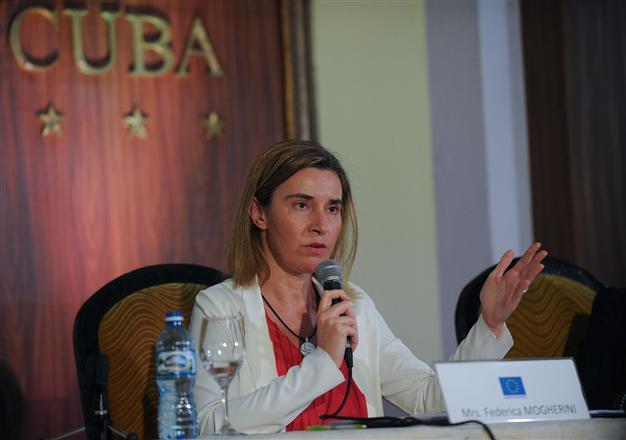EU and Cuba to speed up talks to normalize ties
HAVANA - Agence France-Presse

The EU High Representative for Foreign Affairs and Security Policy and Vice President of the European Commission, Federica Mogherini speaks during a press conference in Havana, on March 24, 2015. AFP Photo
The European Union and Cuba have agreed to speed up the pace of normalizing ties and hope to reach an accord by the end of the year, the bloc's top diplomat said Tuesday.Federica Mogherini, the highest ranking EU official ever to visit Cuba, said the fact that she travelled to Havana so soon after taking up the foreign policy chief job on November 1 showed how important the relationship was.
"We have decided to speed up the pace of our negotiations, with the hope of signing the framework of our dialogue" by the end of the year, Mogherini said at a press conference.
The EU suspended its relations with Cuba in 2003 over a crackdown on journalists and activists. But it began talks to restore them again in April 2014, aiming to persuade Havana to improve its human rights record.
Europe is Cuba's top trade partner after Venezuela, with trade of $3.6 billion in 2013. It is also a major investor in Cuba's key tourism sector.
But after two rounds of talks to normalise ties, Cuba postponed the third in December when its secret negotiations with the United States on restoring ties were in full swing.
The third round was finally held earlier this month.
After those talks, the EU's chief negotiator, Christian Leffler, said the two sides still had to overcome "differences of interpretation" on key issues, including Havana's refusal to sign certain human rights treaties.
The top EU diplomat met Tuesday with Cardinal Jaime Ortega, leader of the Catholic Church on the island -- the only group there who can talk officially with the Communist government -- as well as several ministers and senior officials including President Raul Castro. Mogherini said human rights were a key part of the dialogue with Cuba but she did not get into specifics.
She said her talks with Castro on this issue were "positive."
She also announced a 50-million euro plan to help Cuba's agriculture sector and its economic modernization.
Overshadowing these talks is the rapprochement between Cuba and the United States after 50 years of enmity stemming back to the Cold War. In December they announced they plan to restore full diplomatic ties.
Mogherini said there is no competition between the US and the EU with regard to ties with Cuba, calling them "different processes".
She reiterated EU opposition to the US trade embargo against Cuba.
After US President Barack Obama and Castro announced their countries' historic move to restore diplomatic ties on December 17, some of the 28 EU members reacted by demanding the bloc accelerate its own normalization talks with Cuba.
The calls were particularly urgent from Spain, which counts Cuba, its former colony, as a key trade partner and has a historic rivalry with the United States over the island.
Despite the rapprochement, there is no immediate end in sight to the more than five-decade-old embargo, which Obama would need the blessing of the Republican-controlled Congress to lift.
"On the embargo, you know very well the longstanding position adopted by the EU. In particular, at this moment of dialogue between the United States and Cuba, there's no reason for the embargo to continue," Mogherini told Cuban Foreign Minister Bruno Rodriguez.
Eduardo Perera, a political scientist at the University of Havana, said the EU clearly had its eye on the parallel US-Cuban talks.
"In any scenario regarding Cuba, the EU would evaluate the state of Havana's relations with the United States. Not because that determines its actions 100 percent, but to take it into account as a strategic factor," he said.
Mogherini also met Cuban Foreign Trade and Investment Minister Rodrigo Malmierca, who is heading an initiative to attract foreign capital to the island under new, more liberal rules approved a year ago.
Mogherini also met Economy Minister Marino Murillo, the architect of the reforms that Castro has undertaken to revamp Cuba's stagnant Soviet-style economy.
The trip comes as Francois Hollande plans to become the first French president to visit Cuba in May, followed three weeks later by Italian Foreign Minister Paolo Gentiloni.
















